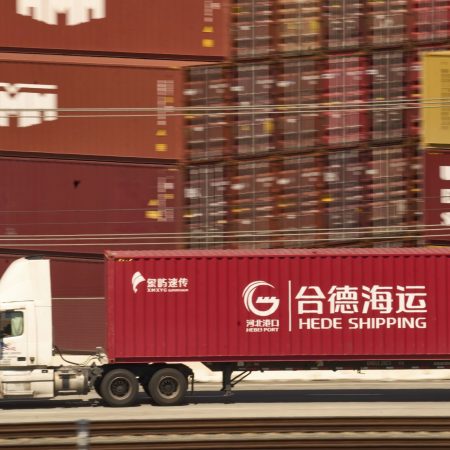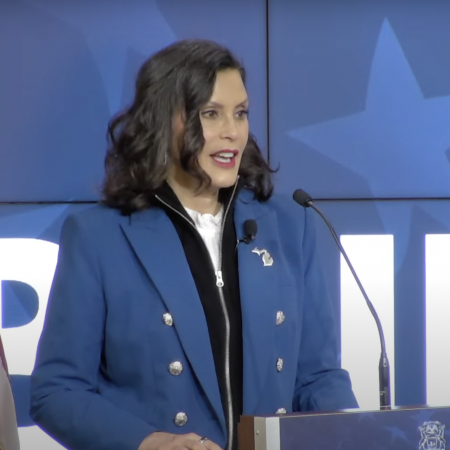Trump limits tariffs on most nations for 90 days, raises taxes on Chinese imports
WASHINGTON (AP) — Facing a global market meltdown, President Donald Trump on Wednesday abruptly backed off his tariffs on most nations for 90 days even as he further jacked up the tax rate on Chinese imports to 125%.
It was seemingly an attempt to narrow what had been an unprecedented trade war between the U.S. and most of the world to a showdown between the U.S. and China. The S&P 500 stock index jumped 9.5% after the announcement, but the drama over Trump’s tariffs is far from over as the administration prepares to engage in country-by-country negotiations. In the meantime, countries subject to the pause will now be tariffed at 10%.
The president hit pause in the face of intense pressure created by volatile financial markets that had been pushing Trump to reconsider his tariffs, even as some administration officials insisted the his reversal had always been the plan.
As stocks and bonds sold off, voters were watching their retirement savings dwindle and businesses warned of worse than expected sales and rising prices, all a possible gut punch to a country that sent Trump back to the White House last year on the promise of combatting inflation.
The global economy appeared to be in open rebellion against Trump’s tariffs as they took effect early Wednesday, a signal that the U.S. president was not immune from market pressures. By early afternoon, Trump posted on Truth Social that because more than 75 countries had reached out to the U.S. government for trade talks and had not retaliated in meaningful ways, “I have authorized a 90 day PAUSE, and a substantially lowered Reciprocal Tariff during this period, of 10%, also effective immediately.”
Trump later told reporters that he pulled back on many global tariffs — but not on China — because people were “yippy” and “afraid” due to the stock market declines. He added that while he expected to reach deals, “nothing’s over yet.”
The president said he had been monitoring the bond market and that people were “getting a little queasy” as bond prices had fallen and interest rates had increased in a vote of no confidence by investors in Trump’s previous tariff plans.
“The bond market is very tricky,” Trump said. “I was watching it. But if you look at it now, it’s beautiful.”
The president later said he’d been thinking about his tariff pause over the past few days, but he said it “came together early this morning, fairly early this morning.”
Asked why White House aides had been insisting for weeks that the tariffs were not part of a negotiation, Trump said: “A lot of times, it’s not a negotiation until it is.”
The 10% tariff was the baseline rate for most nations that went into effect on Saturday. It’s meaningfully lower than the 20% tariff that Trump had set for goods from the European Union, 24% on imports from Japan and 25% on products from South Korea. Still, 10% represents an increase in the tariffs previously charged by the U.S. government. Canada and Mexico would continue to be tariffed by as much as 25% due to a separate directive by Trump to ostensibly stop fentanyl smuggling.
Treasury Secretary Scott Bessent said that the negotiations with individual countries would be “bespoke,” meaning that the next 90 days would involve talks on a flurry of potential deals. Bessent, a former hedge fund manager, told reporters that the pause was because of other countries seeking talks rather than brutal selloffs in the financial markets, a statement later contradicted by the president.
“The only certainty we can provide is that the U.S. is going to negotiate in good faith, and we assume that our allies will too,” Bessent said.
The treasury secretary said he and Trump “had a long talk on Sunday, and this was his strategy all along” and that the president had “goaded China into a bad position.”
Commerce Secretary Howard Lutnick later seemed to contradict the president’s account by saying it was “definitively” not the markets that caused Trump to pause the tariffs, saying that requests by other nations to negotiate prompted the decision.
Prior to the reversal, business executives were warning of a potential recession caused by his policies, some of the top U.S. trading partners were retaliating with their own import taxes and the stock market was quivering after days of decline.
White House press secretary Karoline Leavitt said the walk back was part of Trump’s negotiating strategy.
She said the news media “clearly failed to see what President Trump is doing here. You tried to say that the rest of the world would be moved closer to China, when in fact, we’ve seen the opposite effect. The entire world is calling the United States of America, not China, because they need our markets.”
The head of the World Trade Organization, Ngozi Okonjo-Iweala, said the trade war between the U.S. and China could “could severely damage the global economic outlook” and warned of “potential fragmentation of global trade along geopolitical lines.”
Market turmoil had been building for weeks ahead of Trump’s move, with the president at times suggesting the import taxes would stay in place while also saying that they could be subject to negotiations.
Particularly worrisome was that U.S. government debt had lost some of its luster with investors, who usually treat Treasury notes as a safe haven when there’s economic turbulence. Government bond prices had been falling, pushing up the interest rate on the 10-year U.S. Treasury note to 4.45%. That rate eased after Trump’s reversal.
Gennadiy Goldberg, head of U.S. rates strategy at TD Securities, said before the announcement that markets wanted to see a truce in the trade disputes.
“Markets more broadly, not just the Treasury market, are looking for signs that a trade de-escalation is coming,” he said. “Absent any de-escalation, it’s going to be difficult for markets to stabilize.”
John Canavan, lead analyst at the consultancy Oxford Economics, noted that while Trump said he changed course due to possible negotiations, he had previously indicated that the tariffs would stay in place.
“There have been very mixed messages on whether there would be negotiations,” Canavan said. “Given what’s been going on with the markets, he realized the safest thing to do is negotiate and put things on pause.”
The whipsaw-like nature of Wednesday could be seen in the social media posts of Bill Ackman, a hedge fund billionaire and Trump supporter.
“Our stock market is down,” Ackman posted on X. “Bond yields are up and the dollar is declining. These are not the markers of successful policy.”
Ackman repeated his call for a 90-day pause in the post. When Trump embraced that idea several hours later, an ebullient Ackman posted that Trump had “brilliantly executed” his plan and it was “Textbook, Art of the Deal,” a reference to Trump’s bestselling 1987 book.
Presidents often receive undue credit or blame for the state of the U.S. economy as their time in the White House is subject to financial and geopolitical forces beyond their direct control.
But by unilaterally imposing tariffs, Trump has exerted extraordinary influence over the flow of commerce, creating political risks and pulling the market in different directions based on his remarks and social media posts. There still appear to be 25% tariffs on autos, steel and aluminum, with more imports, including pharmaceutical drugs, set to be tariffed in the weeks ahead.
The tariffs frenzy of recent weeks has taken its toll on businesses and individuals alike.
On CNBC, Delta Air Lines CEO Ed Bastian said the administration was being less strategic than it was during Trump’s first term. His company had in January projected it would have its best financial year in history, only to scrap its expectations for 2025 due to the economic uncertainty.
“Trying to do it all at the same time has created chaos in terms of being able to make plans,” he said, noting that demand for air travel has weakened.
Before Trump’s reversal, economic forecasters said his second term has had a series of negative and cascading impacts that could put the country into a downturn.
“Simultaneous shocks to consumer sentiment, corporate confidence, trade, financial markets as well as to prices, new orders and the labor market will tip the economy into recession in the current quarter,” said Joe Brusuelas, chief economist at the consultancy RSM.
Bessent has previously said it could take months to strike deals with countries on tariff rates. But in a Wednesday morning appearance on “Mornings with Maria,” Bessent said the economy would “be back to firing on all cylinders” at a point in the “not too distant future.”
He said there has been an “overwhelming” response by “the countries who want to come and sit at the table rather than escalate.” Bessent mentioned Japan, South Korea, and India. “I will note that they are all around China. We have Vietnam coming today,” he said.
Reporting by Josh Boak, Associated Press. Associated Press writer Michelle L. Price contributed.
The post Trump limits tariffs on most nations for 90 days, raises taxes on Chinese imports appeared first on WDET 101.9 FM.


